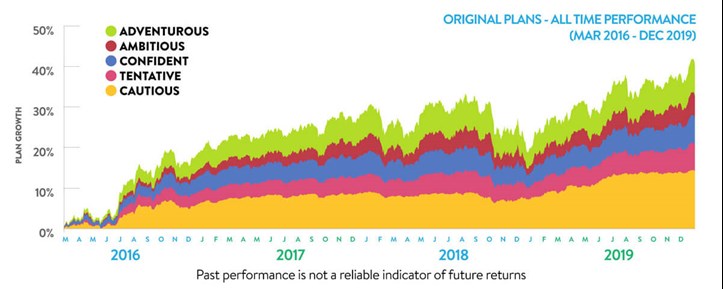2019 was an amazing year for Wealthify customers, with all our Plans posting strong gains. Even better, most of our Plans showed double-digit growth. However, if you have a look at our simulated past performance*, you may have noticed in 2018, that our Plans delivered negative returns. This is something we feel is important not to shy away from. Firstly, there’s no denying it, seeing these negative percentages can be scary and a bit unsettling. After all, you’re investing to make your money work harder! But it’s important to put things in perspective and remember the unpredictable nature of investing. Here’s what you need to know about negative investment performance.
Why did our investment Plans go down in 2018?
Simply put, 2018 wasn’t a good year for markets. February that year saw financial markets drop as investors expectations for the rate at which the US Federal Reserve would raise interest rates accelerated steadily through the year, something that’s seen as bad for stock markets. The US central bank did indeed raise interest rates (four times in fact!), taking them to the highest level since before the 2008 Financial Crisis. The Bank of England also raised interest rates to the highest rate since 2009, as concerns around rising UK inflation grew.
Also, critically, 2018 saw the US-China trade tiff turn from words into action when the US announced in March 2018 that it would place tariffs on Chinese steel and aluminium. This was followed by further tariffs on an array of Chinese goods in July and September and swiftly followed by retaliation from China.
The rise in uncertainty surrounding trade between the world’s two biggest economies, crucial to global growth at a time when central banks were becoming warmer to the idea of higher interest rates took hold and really shook market confidence. But these are not the only reasons why global stock markets remained on alert. In 2018, many leading economies started slowing down. And let’s not forget the Brexit saga which caused increased concern amongst global investors with regards to UK investments.
What do negative rates of returns mean?
A negative rate of returns is synonymous with poor performance and your investments could be losing value. Seeing negative percentages can be stressful, and you may be tempted to withdraw your funds and close your account. But reacting to market drops and selling could hurt your investment journey. Think about it. You’re only making a real loss when you sell your investments at a lower price than you bought them. If you resist the urge to sell and keep your Plan open, the loss remains hypothetical there’s still a chance your investments could see their value rise if markets recover.
More importantly, negative rates of returns are just a reminder of the unpredictable nature of markets. All financial markets have ups and downs. Take the FTSE 100 for example, between 1984 and 2019, the UK market had 27 years of positive returns and 9 years where it delivered negative returns1.
However, because the majority of years have seen positive performance, whilst gains have averaged 15.8% and declines only 12.3%, the FTSE is now 1373% higher than where it began (including reinvested dividends) – demonstrating how long-term gains over this time period far outweigh the more temporary blips.
Market bumps are part and parcel of being an investor so, it’s an important lesson to learn to weather the storm and accept that your investments may go down from time to time.
Have a look at the simulated performance of our Plans since they started. You’ll clearly see the bumps experienced in 2018. But now try to focus on the bigger picture. You’ll notice that all our Plans have grown since we launched them. And in less than 4 years, our top performing Plan has grown by over 40%, despite the 2018 market performance!

What to do when financial markets go down?
As soon as markets fall, it’s important to stay calm and resist the urge to react to the drop. It may sound a bit counter-intuitive but doing nothing and sticking with your investments for a number of years could help you ride out the bumps and maximise your potential returns. Indeed, the longer you remain invested, the more likely you are to see positive growth. For instance, people who’ve invested in the FTSE 100 for any 10-year period between 1984 and December 2019 have had an 89% chance of making a gain2.
If you have any questions about your Plan(s) or our investment performance, please feel free to contact our Customer Care team on 0800 802 1800 or via Live Chat.
1: Total Return Data from Bloomberg
2: Data from Bloomberg
*Simulated’ returns are so named as they are based on the performance of a model which identically mirrors the decisions we take on customers’ Plans. It is based on an account size that is over £500 and assumes that our maximum Wealthify fee of 0.60% is taken, as well as underlying fund costs. Individual customer returns may deviate slightly from the model figures, particularly those customers who may have added to or withdrawn from their Plans throughout the year or have a different fee rate.
Past performance is not a reliable indicator of future performance.
Please remember the value of your investments can go down as well as up, and you could get back less than invested.



